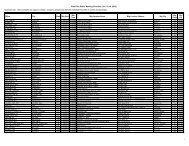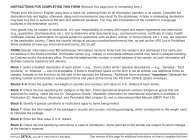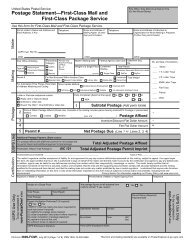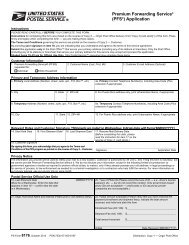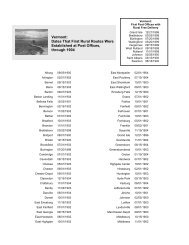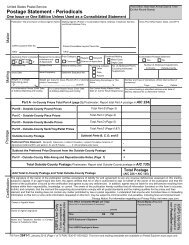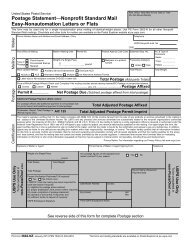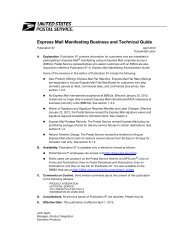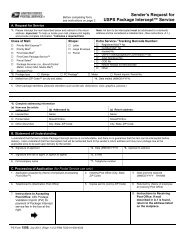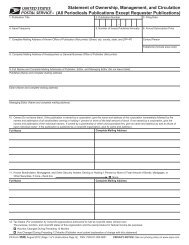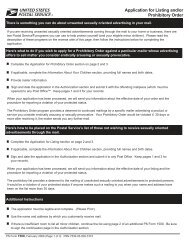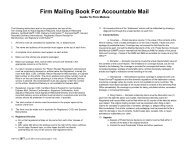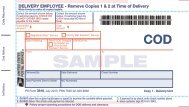Postal Bulletin 22144 - December 23, 2004 - USPS.com
Postal Bulletin 22144 - December 23, 2004 - USPS.com
Postal Bulletin 22144 - December 23, 2004 - USPS.com
You also want an ePaper? Increase the reach of your titles
YUMPU automatically turns print PDFs into web optimized ePapers that Google loves.
POSTAL BULLETIN <strong>22144</strong> (12-<strong>23</strong>-04)<br />
How Does the <strong>Postal</strong> Service Help to Prevent Mail Fraud Scams?<br />
7<br />
The Mail Fraud Statute is the oldest and most effective consumer protection statute, and <strong>Postal</strong> Inspectors have been<br />
using that statute to preserve the integrity of the U.S. Mail since the law was enacted in 1872. <strong>Postal</strong> Inspection Service<br />
efforts have <strong>com</strong>bined vigorous enforcement of the law with public education, consumer awareness, and crime prevention<br />
programs. <strong>Postal</strong> Inspectors work with local, state, federal, and international law enforcement agencies — as well as a variety<br />
of bank and credit card issuers, financial institutions, retail merchants, credit bureaus, and other industry sources — to help<br />
prevent all types of mail fraud schemes and to educate consumers.<br />
What Can You Do to Protect Yourself From Be<strong>com</strong>ing Work-at-Home Fraud Victims?<br />
Ask questions! Every year, thousands of people and businesses are victimized by fraudulent schemes. In general, you<br />
should be skeptical of any offer that sounds “too good to be true.” Legitimate work-at-home program sponsors should provide<br />
information in writing about the program they are offering. <strong>Postal</strong> Inspectors offer these tips to help you evaluate questionable<br />
offers:<br />
Closely examine the ad or offer. The <strong>com</strong>pany may not be offering to employ you directly, only to sell you training and<br />
materials and to find customers for your work. A legitimate <strong>com</strong>pany will be happy to give you information about exactly<br />
what you will be doing and for whom.<br />
Check out the <strong>com</strong>pany. Research work-at-home opportunities through online sources or in the “Work-At-Home<br />
Sourcebook” and other resources that may be available in your local library. These resources provide good advice and<br />
list legitimate <strong>com</strong>panies that hire people to work for them at home. Also check out the <strong>com</strong>pany with the Better<br />
Business Bureau, state Attorney General, or local consumer protection agency.<br />
Steer clear of “start-up” fees. Fraudulent promoters often ask for upfront payments for software, business kits, supplies,<br />
membership fees, or lists of hiring <strong>com</strong>panies. Find out what the total cost is for the work-at-home program and<br />
what you will get for your money.<br />
Know the refund policy. If you must purchase equipment or supplies, ask if, and under what circumstances, you can<br />
return the material for a refund.<br />
Find out if there is really a market for your work. Claims that there is a market for work such as envelope stuffing<br />
and craft making may not be true. If the <strong>com</strong>pany says it has customers waiting, ask for the names of the customers<br />
and contact them to confirm. Get references for other people who are doing the work. Ask the references if the <strong>com</strong>pany<br />
has kept its promises.<br />
Be suspicious. Beware of advertisements that make unbelievable claims about job opportunities. Particularly be wary<br />
of any job offer that doesn’t pay a regular salary or involves an overseas <strong>com</strong>pany.<br />
Take your time. Don’t be pressured into making a quick decision. Con artists make a living on their victims’ poor judgment.<br />
Be smart. Seek advice and double check the “facts.”<br />
Don’t believe that you can make big profits easily. Operating a home-based business is just like any other business — it<br />
requires hard work, skill, good products or services, and time to make a profit. There is no easy way to wealth. A consumer’s<br />
good judgment is the first, last, and best line of defense against the con artist.<br />
Who Should You Call if You Are the Victim of a Work-at-Home Scam?<br />
If you have spent time and money on a work-at-home program you believe may not be legitimate, you should contact the<br />
<strong>com</strong>pany and ask for a refund. If a refund is not forth<strong>com</strong>ing, tell the promoter you plan to notify law enforcement officials.<br />
Keep careful records of everything you do to recover your money. Document phone calls, keep copies of all paperwork such<br />
as letters and receipts, and record all costs involved. You should also file a <strong>com</strong>plaint with the following:<br />
<strong>Postal</strong> Inspectors. Responsible for enforcing the Mail Fraud Statute. You can file a fraud <strong>com</strong>plaint at the local Post<br />
Office, by calling 800 FRAUD IS (800-372-8347) or online at www.usps.<strong>com</strong>/postalinspectors.<br />
The Federal Trade Commission. Works for the consumer to prevent fraud and deception. Call 877-FTC-HELP<br />
(877-382-4357) or log on to www.ftc.gov.<br />
The Better Business Bureau at www.bbb.org.<br />
Your state Attorney General’s office.<br />
Your local consumer protection office.<br />
The publication in which the ad appeared. Contact the publication’s advertising manager.




